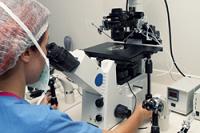Advertisment
Atherosclerosis in HIV patients linked to infection, not treatment

Report from the Transcatheter Cardiovascular Therapeutics (TCT) Scientific Symposium, 27 October – 1 November, San Francisco. Length of infection increases risk for atherosclerosis. HIV infection, not antiretroviral therapy (ART), is associated with risk for atherosclerosis in patients with no history of smoking, particularly those infected for eight years or more. Results of the study led by Moïse Desvarieux, MD, PhD, at Columbia University’s Mailman School of Public Health and at the Institut National de la Santé et de la Recherche Médicale (INSERM), are published in the latest issue of the journal AIDS.
A growing body of literature reports that HIV patients have higher risk for atherosclerotic disease and cardiovascular disease, but it has been unknown whether HIV infection or ART are the responsible factors, and to what extent traditional cardiovascular risk factors, chiefly smoking, are responsible. Previous studies on HIV, ART, and atherosclerosis had included smokers which made it difficult to disentangle the relationship. While previous studies had looked at specific inflammatory markers, none had studied the impact of inflammatory imbalance on atherosclerosis in the context of HIV. The authors hypothesized that the imbalance between pro- and anti-inflammatory markers would matter more for atherosclerosis than specific markers.
To explore the question, the researchers performed a retrospective study of 100 HIV-positive never-smokers for a minimum of 2 years, of whom half had never received ART and half had been treated with ART for at least 4 years, along with 50 HIV-negative controls. They looked for correlations between measures of carotid intima-media thickness, or c-IMT—a measure of cardiovascular health—and, in a first, inflammatory imbalance. Statistical adjustments were made for age, hypertension, and diabetes as well as HIV-infected patients with extremely low counts of lymphocytes, a type of white blood cell.
They found levels of c-IMT were significantly elevated in patients who had been infected for eight years or longer, even those not on ART. Longer time with the infection was also associated with weakened anti-inflammatory response profiles, irrespective of the pro-inflammatory response. “Lower anti-inflammatory response has been linked to increased risk for atherosclerosis, pointing to a potential mechanism within the context of HIV,” notes Dr. Franck Boccara, professor of cardiology at Saint-Antoine hospital in Paris and a co-author of the study who will be initiating a 4-month sabbatical at Mailman this week.
The study does not determine whether HIV infection is a cause of atherosclerosis, the authors caution.
But it does contribute significantly by the careful choice of never-smokers and the hard-to-attain group of subjects with 2-year long HIV infection who had not yet required ART initiation, thus allowing for the study of HIV-infection alone. “We suggest that larger studies incorporate and validate the importance of inflammatory imbalance in occurrence of atherosclerosis” concludes Dr. Desvarieux, Mailman School associate professor of Epidemiology, who led the transnational multidisciplinary collaboration with scientists at INSERM and the Paris hospital systems.
About 1.1 million Americans live with HIV, according to the Centers for Disease Control. Globally, 34 million are infected, according to the World Health Organization.
This study was supported by the L’Agence nationale de recherches sur le sida et les hépatites virales (ANRS) (grant number 2007/303); and Sidaction (grant number AI 20). Moïse Desvarieux is also the recipient of a Chair in Chronic Disease from the Ecole des hautes études en santé publique (EHESP), France. The collaboration was rendered possible by a Contrat d’Interface (to M.D.) between Inserm and Hôpital Saint-Antoine. The authors report no conflicts of interest.
Contact: Stephanie Berger
sb2247@columbia.edu





